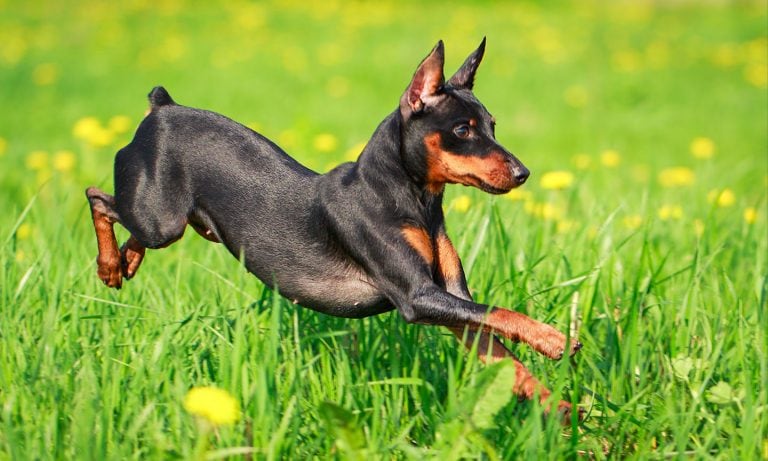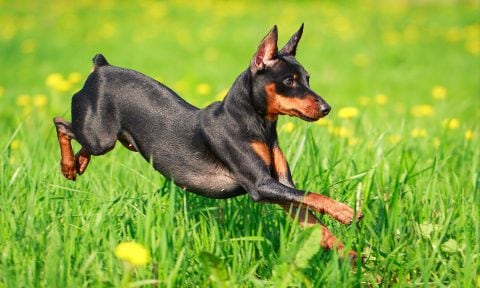Chihuahua vs Miniature Pinscher

Breed Snapshot
Best For
Equal parts affectionate, charming and mischievous, Chihuahuas are small, adaptable dogs who thrive in households (small and large!) with no other dominant pets. This toy breed's ideal pet parent provides companionship, care and lots of...
Equal parts affectionate, charming and mischievous, Chihuahuas are small, adaptable dogs who thrive in households (small and large!) with no other dominant pets. This toy breed's ideal pet parent provides companionship, care and lots of attention.
Chihuahua Temperament
Chihuahuas are charming little scamps with an eye for mischief and a sense of bravery that outsizes their physicality. They’re playful pups who enjoy a good romp or game, even though it may not last long (depending on their energy level). And they love to snooze on laps an...
Chihuahuas are charming little scamps with an eye for mischief and a sense of bravery that outsizes their physicality. They’re playful pups who enjoy a good romp or game, even though it may not last long (depending on their energy level). And they love to snooze on laps and cuddle—that is, after all, what they’re bred to do.
They like a lot of attention and are quite portable. But even though they’re easily carried, they do still need to learn how to walk on their own and be able to engage in normal dog behaviors, like sniffing, exploring and playing. In other words, don’t pop them in a purse or a stroller and tote them everywhere—unless, of course, it’s somewhere risky with lots of feet that could hurt a tiny paw, like an airport or street festival.
The Chihuahua dog breed is said to resemble a terrier with their demeanor and can become quite feisty, especially if they feel threatened. Some sites report that the Chihuahua bite force is 3,900 pounds per square inch (psi), but those so-called Chihuahua facts are wildly inaccurate, when a lion is only at 600 psi. In truth, Chihuahuas usually inflict no more than a Level 1-3 bite, with no puncture deeper than half the length of one of their canine teeth.
To help your Chihuahua puppy overcome a nipping or protective tendency, socialize them by safely and slowly introducing them to new people and places from the get-go and start training when they are young. Early training will also help this smallest of dog breeds become wonderfully friendly and receptive to all members of the family, including other pets.
Chihuahua Traits

Breed Snapshot
Best For
These traits are rated on a scale of 1-5 with 1 being the lowest and 5 being the highest. Remember: Dogs are individuals, and not all dogs, even those of the same breed, will exhibit all the...
These traits are rated on a scale of 1-5 with 1 being the lowest and 5 being the highest. Remember: Dogs are individuals, and not all dogs, even those of the same breed, will exhibit all the same qualities.
Miniature Pinscher Temperament
With their larger-than-life personalities, Miniature Pinschers are very playful and eager to learn—and show off—new tricks. They’re motivated to explore uncharted territory, whether a hidden corner at home or a path you haven’t walked yet. Extremely loyal to their families, they can be headstrong and a b...
With their larger-than-life personalities, Miniature Pinschers are very playful and eager to learn—and show off—new tricks. They’re motivated to explore uncharted territory, whether a hidden corner at home or a path you haven’t walked yet. Extremely loyal to their families, they can be headstrong and a bit demanding if they don’t get the attention they yearn for.
When you don’t have their attention, Min Pins are strong-willed and have a mind of their own. More often than not, they’re comfortable being independent and prefer to play with their own breed. They do tend to be friendly and make great companions, but they can be standoffish with other breeds unless they have a closely matching personality. Watch your Min Pin carefully around younger children, who may play rough—as puppies, this dog’s thin limbs can be easily injured.
Since these small dogs were bred to kill small rodents in the home, it should come as no surprise that they love to work and have a penchant for chasing and capturing small critters. They’re known to pinch prey aggressively when they catch them.
Despite their small size, this toy breed tends to be highly protective of their pet parents, especially when other dogs are in the mix. They also try to one-up other dogs to make themselves look bigger. Without proper socialization, Min Pins can be feisty, nippy and possessive of resources like food and toys. They may take some time to adjust to households with multiple animals, including cats. Kids shouldn’t snatch food or toys away from Min Pins as your pup may interpret that as a threat. Early socialization from puppyhood is important and will help them be well-behaved members of the family.




